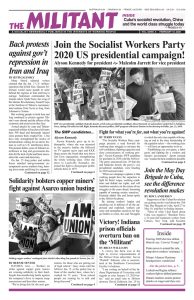Over 700 workers at the Coop Refinery in Regina, Saskatchewan, are fighting to defend their pensions. They were locked out Dec. 5 after they voted overwhelmingly to strike.
Unifor, the workers union, mobilized hundreds of members from across Canada Jan. 20 to defy an injunction that limits pickets. The bosses are bringing managers and strikebreakers to try to keep production going. They got the courts to impose a 10-minute limit for the picketers stopping scab vehicles from getting into the plant. There were 14 arrests, including Jerry Dias, the national union president. The union now faces fines of 100,000 (Canadian dollars) for violating the injunction ($75,963).
“It’s in the tough times that solidarity means something,” Sophie Albert, president of Unifor Local 522 in Montreal, who came to support the locked- out workers, told the Regina Leader-Post. “Maybe one day it’s going to be my local that needs some help, and we’re going to need people coming our way.” The Canadian Labour Congress and several national unions have pledged their support.
The owners want to get rid of the workers’ defined benefit pension plan that is completely paid by the company. They demand workers choose between a new plan that doesn’t guarantee what workers will get or keep the present plan with workers having to pay part of the costs.
Kevin Bittman, union president at the refinery, told this Militant worker-correspondent in a phone interview that without the union workforce in the plant there are major safety issues. “They have taken 280 process workers and replaced them with 120 managers,” he said. “The company is bringing people in with helicopters and has built a camp to house 500.”
There are no negotiations scheduled and the company says it won’t negotiate as long as the picketers’ blockade is in place.
“The employer [made] $2.5 billion in the last three years,” said Scott Doherty, chief negotiator for the union. “There is no reason this employer can’t afford to continue to make the pension contributions it does.”

